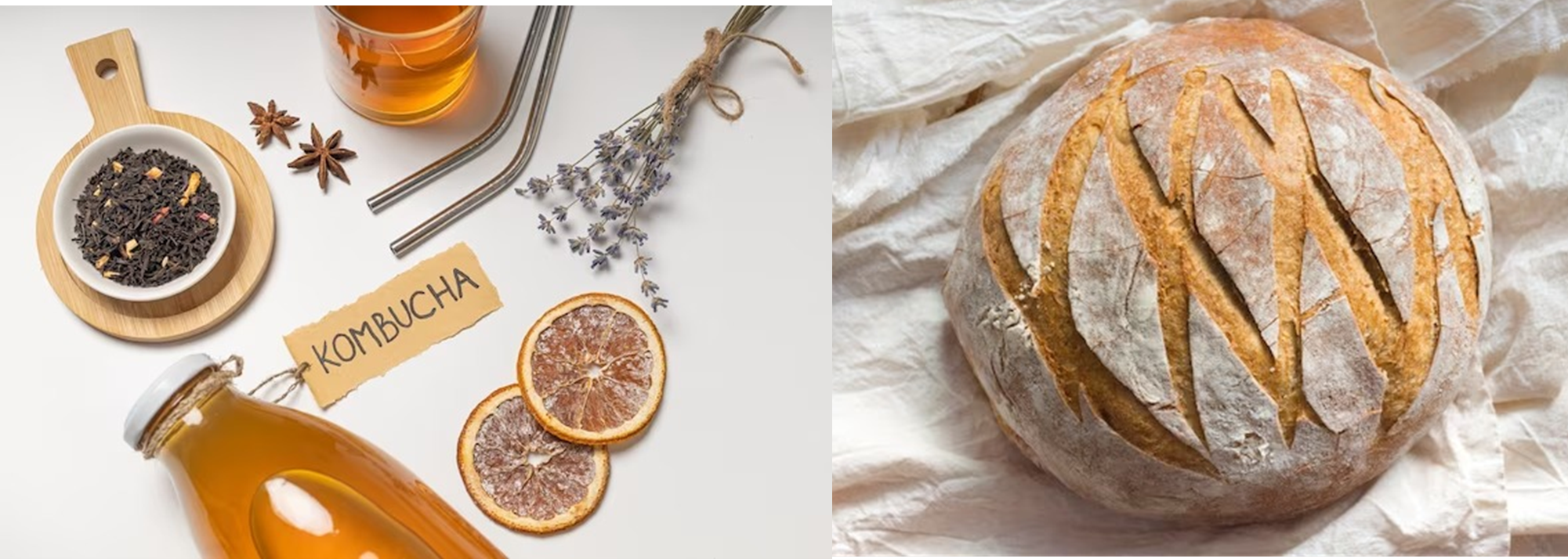Introduction
Do you enjoy fermenting products such as kombucha, sourdough bread and sauerkraut at home? Well, these products have been increasingly popular in recent years and many of you may be keen to ride the trend and ferment these products at home. However, there could be potential food safety issues if you fail to exercise good food safety practices.
What is Home Fermentation?

Images by Freepik
Home fermentation refers to the use of microorganisms like bacteria, yeast or fungi to convert nutrients in food into other substances in a domestic setting.
What are the food safety concerns of home fermented products
While home fermentation relies on the growth of specific microorganisms, there is a risk of unwanted bacteria, moulds or other contaminants entering the food or beverage due to contaminated ingredients and improper processing, storage or handling. You might fall ill from consuming them. For example, fermenting corn and coconut-based products has risk of bacterial contamination that results in the production of Bongkrekic acid. This acid is a toxin that is harmful to our liver, brain and kidneys and in severe cases, can be life threatening. Therefore, it is important to use well-defined cultures under controlled conditions and maintain proper hygiene and use clean containers for storage to minimise growth of harmful microorganisms.
Besides microbial concerns, some of these fermented products may require the use of certain strains of bacteria or yeast that can cause allergies. Allergens may also contaminate the fermented products unintentionally when they are prepared in kitchens that have been exposed to allergenic food such as nuts. Thus, you should exercise caution during preparation and ensure that the food preparation area is free from allergens.
What are SFA’s advisories on the safety of home fermentation?
Food safety is a joint responsibility between the government, industry and consumers. We strongly encourage you to adopt good food safety practices while making your own home-fermented products. Here are some tips for you:
- Exercise good food safety practices such as good hand hygiene, proper sanitisation of food contact surfaces and all utensils/equipment used in the fermentation process.
- Store home-fermented products in the fridge to minimize growth of unwanted microorganisms.
- Use clean, sanitized and airtight food-grade containers when storing home fermented products.
- Purchase ingredients from reputable sources such as SFA-licensed retailers.
- Ensure that products are properly labelled, with known food allergens listed and production date indicated.
- Select a reliable recipe and follow the instructions (specified temperature and time). to ensure a successful fermentation to control harmful bacteria.
- Monitor and control the acidity during fermentation as the production of acid aids in creating a hostile environment for harmful microorganisms. When preparing kombucha, check that the pH of the brew is between 2.5 and 4.2 as fermenting it for too long can cause it to taste overly sour, while insufficient fermentation time allows harmful microorganisms to survive and grow.
- After consumption, store the remainders in the fridge, with a clean and airtight container.
- Avoid these products if you have known allergies and seek immediate medical attention if you encounter a severe allergic reaction.
About the author
Soon Fang Min is a Scientist from the Risk Assessment and Communications Department of the National Centre for Food Science. She has attained a Bachelor of Science with Honours in Food Science and Technology from the National University of Singapore.